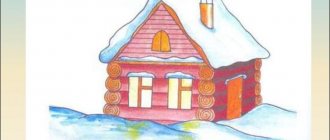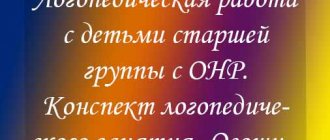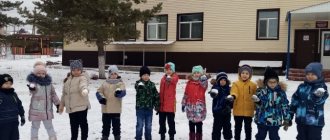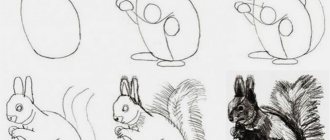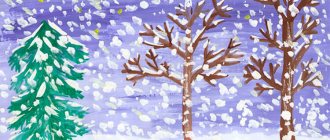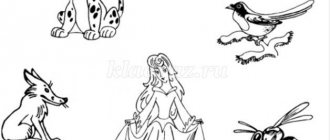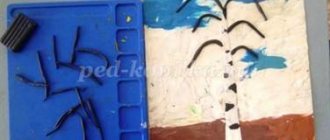LiveInternetLiveInternet
Quote from Tatyana57
Read in full In your quotation book or community!
SPEECH DEVELOPMENT. LEXICAL TOPICS “WINTER” AND “WINTER FUN”.
CHILDREN SHOULD KNOW THE NOUNS: winter, cold, wind, snow, snowflake, snowball, snowfall, snowman, ice, floe, icicle, blizzard, blizzard, drifting snow, cold, pattern, crust, frost, snowdrift, thaw, hoarfrost, cereals, flakes , drops, sleds, skis, skates, skating rink, ski track, snow woman, fur coat, sheepskin coat, down jacket, felt boots, mittens, mittens, hat, December, January, February. ADJECTIVES: cold, frosty, snowy, shiny, crunchy, crumbly, sticky, wet, white, clean, fluffy, windy, sunny, patterned, crackling, strong, transparent, icy, icy, light, wintery, sparkling, hard. VERBS: came, goes, falls, spins, freezes, covers, falls asleep, sweeps, freezes, howls, makes noise, drips, shines, draws, flies, melts, falls out, curls, freezes. CHILDREN SHOULD BE ABLE TO SELECT SIGNS:. Snow - white, fluffy, light, sparkling, cold... Winter - cold, harsh, frosty, windy... Frost..., ice..., blizzard..., snowflake... KNOW THE WINTER MONTHS: December, January, February. December after November and before January. January - ... February - ... FINISH SENTENCES: In winter, people wear ... (hats, fur coats ...). Winter brings...(snowfalls, frosts...). The water froze on...(rivers, lakes...). I like to ride in winter...(sleighing, skiing...). SELECT NOUNS: Snowy - lump, town, whirlwind... Snowy - woman, mountain, veil... Frosty..., frosty..., frosty..., icy... . CALL IT AFTERLY: Winter - winter, frost - frost, snow - snow, ice - ice, snowdrift - snowdrift, blizzard - blizzard... COMPLETE STORIES ACCORDING TO PLAN: How did you notice the onset of winter? Name its first signs in nature. Winter months. Habits of animals and birds. Winter fun and entertainment. "WINTER FUN". CHILDREN SHOULD KNOW THE NOUNS: winter, snow, snowflake, snowball, Snow Maiden, Santa Claus, snowman, snow woman, ice, skating rink, skates, sled, skis, slide, fun, Christmas tree, holidays, garland, tinsel, balls, star, confetti , gifts, holiday, joy, fun, games, carnival, round dance, masks, calendar, firecrackers, cones, snowdrift, snowball, hockey, stick, puck, competition. ADJECTIVES: cold, frosty, joyful, snowy, shiny, colorful, cheerful, crackling, festive, New Year's, patterned, crispy, fluffy, icy, sad, silvery, motley. VERBS: walks, steps, spins, draws on the windows, covers, dances, has fun, rejoices, lights up, flares up, throws, throws, descends, creaks, runs, overtakes, falls, shakes off, freezes, sticks, stings, pricks. TOGETHER WITH THE CHILD. SELECT A SIGN FOR THE OBJECT: Christmas tree (what?)…… Holiday (what?)….. Christmas tree decorations (what?)….. WHO NEEDS WHAT: Hockey player – stick, puck, skates, skating rink, goal… Skier –… Figure skater – ... Hill - ... Snowman - ...
WE IMPROVE THE ABILITY TO RELL. HEALTHY WALK. “There is a lot of snow in the city park in winter. Snow lies on the ground, on benches, on tree branches. The guys went to the park. They built a snow fort there and started playing snowballs. One snowball fell into the feeder. The boys noticed that it was empty. They took the seeds out of their pockets and poured them into the feeder. And from another tree two squirrels were looking at the guys. The boys prepared nuts for them. It turned out to be a fun and useful walk.” * ANSWER THE QUESTIONS: — Where is the snow? -Where did the guys go? -What did they build? — How did the guys start playing? -Where did the snowball fall? -What did the boys notice? —What did you feed the birds? — What did the boys prepare for the squirrels? — What kind of walk did the guys have? WARM FEEDER. "It was winter. Vanya was coming from kindergarten. he carried a gingerbread in his hand. The boy did not notice how he dropped the mitten and gingerbread. Vanya came home - no mittens, no gingerbread. Where are they? And at this time the sparrows flew onto the gingerbread, pecking at it and chirping. They had already eaten all the gingerbread and began to peck at the mitten. Vanya looks out the window at his mitten and thinks: “What a warm bird feeder this turned out to be.” * ANSWER THE QUESTIONS: - Where did Vanya come from? -What was he carrying? - What didn’t Vanya notice? - Who pecked the gingerbread? - What did Vanya think? * Name what wintering birds you know. * Tell me who gives the voice: a sparrow tweets, a crow..., a magpie..., a dove..., a cuckoo..., a tit....
Series of messages “Speech Development”:
Part 1 - POSTER. BERRIES. Part 2 - SPEECH DEVELOPMENT. LEXICAL TOPIC “POWERIES”. ... Part 7 - SPEECH DEVELOPMENT. LEXICAL TOPIC "TABLEWARE". Part 8 - SPEECH DEVELOPMENT. STORY PICTURES “WINTER FUN”. Part 9 - SPEECH DEVELOPMENT. LEXICAL TOPICS “WINTER” AND “WINTER FUN”. Part 10 - Learning to write stories. Part 11 - VILLAGE YARD. A STORY ABOUT PETS. ... Part 26 - SPEECH DEVELOPMENT. HATS. Part 27 - SPEECH DEVELOPMENT. LEXICAL TOPIC “HOUSEHOLD ELECTRICAL APPLIANCES”. Part 28 - SPEECH DEVELOPMENT. LEXICAL TOPIC "HOUSE".
Summary of a speech therapy lesson on the topic Winter in the preparatory group
Summary of a speech therapy lesson for children 6-7 years old “Hello, winter-winter!”
Author: Galina Alekseevna Medvedeva, teacher-speech therapist of the municipal budgetary preschool educational institution “Kindergarten No. 146” in the city of Ryazan.
Description. This work is a summary of a lesson on teaching children with general speech underdevelopment of levels III-IV in the preparatory group of a kindergarten.
This is a comprehensive frontal lesson on teaching preschoolers literacy and developing their lexical and grammatical concepts on the lexical topic “Winter”, based on game teaching techniques. It will be of interest to speech therapists working in correctional groups for children with severe speech disorders, teachers of speech therapy groups and parents of students with speech problems. Speech therapy lesson in the preparatory group “Hello, winter-winter!”
- a lesson on the formation of lexical and grammatical concepts and teaching literacy (school preparatory group, third year of study) Purpose: to generalize and systematize children’s ideas about winter phenomena in nature, to develop the ability to conduct syllabic and sound analysis of words, to practice composing complex sentences with a conjunction in a word because
, in the selection of related words, in the practical acquisition of methods of word formation and inflection of nouns.
Objectives: - clarify and systematize children’s ideas about the winter season, the characteristic signs of winter in living and inanimate nature; - develop the ability to compose sentences with prepositions according to the proposed model, based on the graphic representation of the sentence and pictures; practice composing complex sentences with the conjunction “because”; - exercise in selecting subject pictures to the sound scheme, determining the quantity, sequence and characteristic features of sounds (vowels-consonants, hard-soft); - practice in the formation of new related words, using suffixes, increasing the syllabic structure of words, achieving a given number of syllables (one - four); - develop the ability to identify the first and last sounds in words by selecting suitable subject pictures; distinguish consonant sounds denoted by the same letter by hardness and softness; — consolidate the ability to correctly use nouns in the accusative and genitive plural cases; — develop phonemic hearing, visual and auditory attention, memory and thinking; — cultivate goodwill, mutual assistance, and the ability to objectively evaluate the answers of other children. Equipment: playing field with a set of eight winter pictures for the game “Change the Word” (for each child); a playing field of five different pictures for the game “Magic Snowflakes” (for each child); handout subject pictures for selecting pairs based on the softness and hardness of consonant sounds (two pictures for each child); models of sentences with prepositions through, about, for, on
and pictures for these models for the game exercise “Come up with a sentence” (5-6 game fields);
playing fields with chips for the game “Pick a picture” (6-8 fields); plot pictures in A-5 format depicting different seasons of the year, 20 pieces. Progress of the lesson,
part 1. Organizing time
Invite the children to guess the riddle: The forest fell asleep under a snow coat, Grass does not grow in the fields, Ice bound the streams and rivers. Came to visit us - ... (winter). — Today in class we will talk about winter and winter signs in nature, all games and tasks will be related to this time of year.
Part 2. Didactic game “It happens - it doesn’t happen”
The speech therapist names the signs of different seasons, and the children name which of them belong to winter and which do not and, if controversial judgments arise, explain their choice: - the shortest day and the longest night of the year; — it’s cold outside, a strong wind is blowing, cold rains are falling, in the morning the puddles are covered with ice; — rivers, lakes and ponds are covered with strong ice, fishermen catch fish by drilling holes in the ice; — people put on warm clothes, it’s bitterly cold outside, there’s often snow and drifting snow; - children make Easter cakes from sand, build cities, roads and bridges; - children make fortresses, slides, snowmen out of snow, sledding, skiing and skating; - you can’t hear the birds singing, hungry birds move closer to human habitation, people hang up feeders and pour food into them; — the sun is shining brightly, the first thawed patches are appearing, streams are flowing, birds are returning from warm regions; — children swim in the river, sunbathe, the longest day of the year; — colorful leaves fall from the trees, the wind blows, it rains often, birds gather in flocks; - it’s cold and hungry in the forest; bears, badgers and hedgehogs sleep in pre-arranged housing; moose, deer and hares gnaw branches and young tree bark; — it’s warm, a gentle breeze is blowing, there are green, lush leaves on the trees, a lot of flowers, berries and mushrooms; — it often snows, the trees are covered with frost, the glass windows are painted with “patterns”, the birds fluff up like balloons.
Part 3. Didactic game “Give me a word”
The speech therapist begins the sentence, the children repeat it and finish it, choosing the words that are missing in meaning.
In winter, tree branches are often covered ... ( snow, frost
).
Children take with them for a walk... ( sleds, skis, ice skates, snow scooters,
and so on).
In order not to freeze on the street, people wear... ( fur coats, down jackets, sheepskin coats,
and so on).
You can’t do without... on an ice slide ( sleds, skis, cheesecakes, ice cubes,
and so on).
In winter, you can get frostbite on your hands if you go out for a walk without... ( mittens, gloves, mittens
).
Winter cannot exist without... ( snow, frost, blizzard, frost
, and so on).
Part 4 Didactic game “Change the word”
Each child has a playing field and a set of 8 subject pictures on a winter theme.
You need to fill in eight empty boxes with pictures (two under each number) so that the number of syllables in the word corresponds to the number. In this case, words can be changed by increasing syllables. For example, snow, snowball, snowflake, snowflake, snowball.
The winners of the game are the children who can match all the pictures correctly.
Part 5 Didactic game “Magic snowflakes”
Each child has an image of a snowflake on a piece of paper, an empty window at the tip of each of the six rays, and an object picture drawn on one of them.
Each snowflake is accompanied by a set of five pictures, which must be placed in empty windows in such a way that the first sound of each subsequent picture (clockwise) is the same as the last sound of the previous picture. The picture drawn on the snowflake is the starting point for laying out other pictures. For example, cubes
.
Children lay out in empty windows: toffee, salad, shoes, turkey, ice skating rink
;
the snowflake depicts vegetables
- the children lay them out:
needle, pineapple, catfish, milk, cloud.
The winners are the children who managed to correctly select pictures for all the rays of the snowflake.
Part 6 Didactic game “Pick a Pair”
Each child has two pictures.
You need to find a pair for them (among the pictures of other children). In this pair of pictures, the first sounds differ in hardness and softness, but are denoted by the same letter. For example, a winter hare, an ice shovel, gloves as a gift,
and the like.
Part 7 Physical education minute “Silent Movie”
A variety of music sounds (waltz, dance, polka, march, lullaby) and at the same time as it sounds, a corresponding picture is projected onto the screen: snow is falling, a blizzard is blowing, children are playing snowballs, sledding down the mountain, drawing with a twig in the snow, skating , making a snowman. Children come up with and show movements that correspond to the content of the picture and the nature of the music.
Part 8 Didactic game “Correct the sentence”
The speech therapist pronounces a sentence, and the children listen carefully.
If the teacher said something incorrectly, the children should raise their hands and correct the sentence. If the sentence is correct, clap your hands. It's bitterly cold outside because the children are dressed warmly.
(The children dressed warmly because it was very cold outside.) The rivers were covered with ice because the children were skating. (The children are skating because the rivers are covered with ice.) The trees are covered with frost because the weather was warm the day before. (Correct sentence.) The ice slide is very high because the sleds are going fast. (The sled goes fast because the ice slide is very high.) And so on.
Part 9 Didactic game “Come up with a proposal”
On the board there is a diagram-model of a sentence with a preposition and five pictures for it.
Following the example of a speech therapist, children independently compose a sentence based on this model and the selected picture. Having mastered the algorithm for composing a proposal, they compose it only based on the model. For example, “In winter, children go sledding
.
- says the speech therapist. Children look at the proposed model on the playing field and the pictures and say their proposals: In winter, children skate.
In winter, children go skiing. In winter, children ride snow scooters. Part 10 Didactic game “Pick a picture”
From the three proposed pictures, you need to choose the one that matches the depicted sound pattern (the word consists of four sounds, the sounds and letters in pronunciation and spelling are the same). For example, the sound pattern is presented in the following order: green square, red, blue, red.
For this diagram, three subject pictures are offered for analysis - mountain, winter, sleigh. Children must choose a suitable picture - winter
.
Part 11 Didactic game "Confusion"
Children have a lot of pictures with different seasons. From the proposed pictures, you need to choose those that relate to winter and explain why this picture was chosen.
Part 12 Summing up the lesson
What time of year were you talking about today? What games did you like? What new did you learn? Whose answers did you like the most? Why? How did you help your friends? In conclusion, you can read any poem about winter to the children.
We recommend watching:
Didactic game for teaching literacy in kindergarten. Vowels and sounds of GCD for teaching literacy to children in the preparatory school group “Sounds [V], [V]. Letter B" Workshop for parents of preschool educational institutions. Teaching preschoolers literacy Summary of a lesson on teaching literacy in the senior group
Similar articles:
Educational games for children 6-7 years old at home
Themed games for children 5-6 years old in kindergarten
Outdoor games for children 5-6 years old
Winter games for children of the preparatory group (6-7 years old) in kindergarten
Summary of a winter walk in the preparatory group “Observing coniferous trees”
MAGAZINE Preschooler.RF
Summary of a lesson in a preparatory speech therapy group on the lexical topic “Winter. Winter fun" Compiled by teacher-speech therapist Kolmychenko Yu.Yu. Correctional educational tasks: - consolidation of the idea of winter and its signs - activation and expansion of the vocabulary on the topic “Winter”, “Winter fun” - development of linguistic sense through the formation of related words - formation of nouns and adjectives using diminutive suffixes); - development of coherent speech, practice composing complex sentences with the conjunction A; — consolidation and improvement of skills in sound-syllable analysis of words and word reading;Correctional and developmental tasks: - development of visual and auditory attention and memory, thinking - development of coordination of speech and movement - development of speech breathing - development of personal qualities: curiosity, activity, ability to apply acquired knowledge in independent activities, development of the ability for self-esteem and introspection, independence — development of dialogical speech. Correctional and educational tasks: — nurturing a sustainable interest in the lesson, the desire for vigorous activity, independence in decision-making — developing skills of cooperation, mutual understanding, goodwill, independence. With the integration of areas: “Health”, “Physical Education”, “Work”, “Reading Fiction” Equipment: throwing snowballs, snowflakes with written letters, snowflakes with pictures, pictures depicting children’s fun in summer and winter, images of big and small snowmen, a riddle picture, snowflakes for breathing, blanks for applique. Progress: 1. Organizational moment. - Guys, look at the picture - a riddle, what item do you think is missing? Sleigh, snowman, snowflake Snowman, snowflake, sleigh Snowflake, sleigh? 2. Introduction to the topic: - That's right, the snowman is missing. Let’s play with the word “snowman”, I will start the sentences, and you will finish it with the word “snowman”. We decided to make…. (snowman). We attached a carrot nose to our... (to the snowman). We showed our neighbors... (snowman). We played with our... (snowman). We told everyone about our... (snowman). - Guys, when can you and I build a snowman, at what time of year? 3. Breathing exercises. — That's right, in winter. Look how many beautiful snowflakes we have. You and I will turn into a breeze: As the breeze blows, the snowball will spin. - Oh, do you know how to blow correctly? Tell me how to do it correctly. (We take a deep breath through our nose, our shoulders do not rise, we exhale through our mouth, slowly and for a long time.) - Oh, after the snowflakes our hands are frozen, let's warm them up, blow warm air on them. 4. Main part. — We all love winter very much, it brings a lot of games and entertainment. I'll tell you riddles about winter fun: Friends have waited for winter: They run along the river, sliding. The ice is cut like a knife, performing turns. (Skates) I can’t feel my legs with joy, I’m flying down a snowy hill. Sports have become dearer and closer to me... Who helped me with this... (Skiing.) The whole summer stood, Winters were expected. They waited for the time - They rushed down the mountain. (Sled) On a winter day on a crust of snow, He pushes me down the hill. I'm glad to rush with the wind, my cheerful one. (Snowball) I’ll collect a small round lump of snow, I’ll throw it at a friend, I’ll throw it at my brother, We’re playing, all covered in snow. (Snowballs) They didn’t raise me - they made me out of snow. Instead of a nose, they cleverly inserted a carrot. The eyes are coals, the hands are knots. Cold big. Who am i? (Snowman) - Well done, we have solved all the riddles, and now we will make suggestions for entertainment in winter and summer. In winter, children go ice skating, and in summer they swim in the river. 5. Physical exercise. WINTER FUN We ski with you, The cold snow licks the skis. (children imitate skiing) And then - skating, (they imitate ice skating) But we fell. Oh! (fall) And then they made snowballs, (stand, squeeze an imaginary snowball with their palms) And then the snowballs rolled, (roll an imaginary lump) And then they fell exhausted (fall) And we ran home. (run in a circle) (Nishcheva N.V.) 6. Game “Snowballs” - Look at the board. There are big snowflakes on it. Each of you will throw snowballs at the target. If you hit it, I will turn the snowflake over and there will be a picture on it. You can guess the words by the first sounds (in the names of the pictures). Finch, needle, raspberry, watermelon - WINTER. Scooter, shark, scissors, whale, toys - SLEDGE. 7. “Collect the word.” - Look how many snowflakes we have, lay out your snowflakes, what words did you come up with? (slide, sled, winter, skating rink, skis, pattern). What are the vowel sounds in words? 8. "Big and small." - Look, two snowmen, one big and the other small, I will talk about the big snowman, what he has, and you - about the little one: The big snowman has a red nose. - The little snowman has a red nose. Black eyes Shaggy broom Green bucket Long scarf. We still have winter words, let's call them affectionately too. (dictionary on the topic) 9. “Say the word” - In winter, the whole earth is covered with snow, let’s play with the word “snow”, say the word: Quietly, quietly, as in a dream, Falls to the ground. (Snow.) All the fluffs are sliding from the sky - Silvery. (Snowflakes.) To the villages, to the meadow Everything is going down. (Snowball.) Here's fun for the guys - Getting stronger. (Snowfall.) Everyone is running a race, Everyone wants to play. (Snowballs.) It’s like dressed up in a white down jacket. (Snowman.) Nearby there is a snow figure - This girl - (Snow Maiden.) In the snow, look - With a red breast. (Bullfinches.) As if in a fairy tale, as in a dream, he decorated the entire Earth. (Snow.) Look how many related words the word SNOW has 10. Visual gymnastics. “Week” “Thursday” On Thursdays we look into the distance We don’t regret this time. What is in the distance and what is close The eyes must see. 11. Application “Snowman” Well done guys! We played with you and did some exercises for the eyes. Now divide into pairs. Come to the tables. Geometric shapes are prepared for you. Try making snowmen out of them. (Children lay out snowmen and then glue them onto sheets of paper.) Result. Speech therapist: Well done guys! You did very well today.
| Next > |
